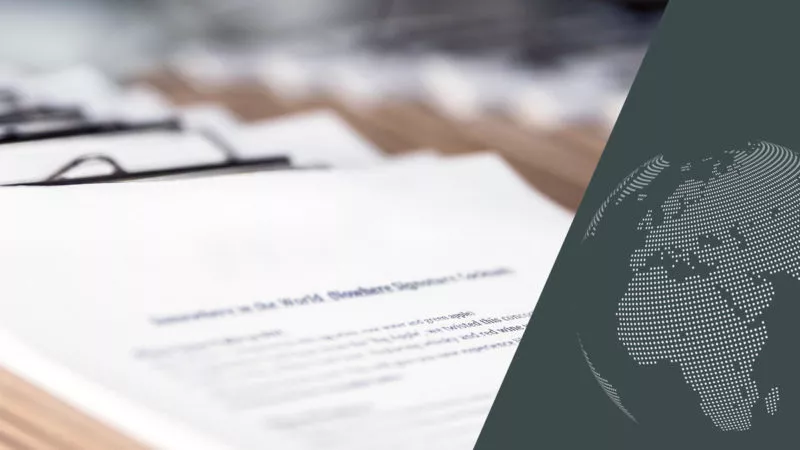APPROVALS, CERTIFICATIONS AND GUIDELINES
Country approvals: further countries

USA
FCC Certification
In order to be allowed to distribute communication hardware, a certification by the Federal Communication Commission (FCC) is necessary, also called FCC certification. Almost synchronously, the FCC certification is divided into 3 large blocks similar to the necessary standards and guidelines of the CE declaration: Electromagnetic Compatibility, Safety Requirements, and Radio Technology Requirements, if any. The FCC’s jurisdiction covers the regulation of radio, television, wire, satellite and cable communications. This thus affects almost all electronic devices commonly used today. In order to obtain approval, there are also so-called certification bodies (TCBs) for manufacturers outside the USA, which have the authority to apply for and grant certification. Unlike CE, where a self-declaration is sufficient (medicine, etc. there are exceptions), the requirements of FCC go well beyond this and require, for example, inspection of circuit diagrams and assembly plans. As proof of FCC certification, the manufacturer is obliged to mark the device with the FCC logo. In the case of radio products, an FCC ID is also required, which must be affixed to the outside of the device. Whether a radio product is certified can be checked on the FCC website by entering the FCC ID.
UL
In addition to the state requirements, UL also has a high status on the American market. The so-called UL certification is primarily a safety test from Underwriters Laboratories. UL does not approve products, but checks whether they meet specific requirements. This includes electrical or mechanical safety as well as fire protection. Many tests are based on the “Occupational Safety and Health Act” – in some areas, however, UL also publishes its own standards and associated test procedures. We recommend that UL certification is only carried out when the project is beyond the PoC phase. Often, for small quantities, the costs are not justified and there is no legal basis for UL.
Provider approvals
Separate approvals are required for some mobile phone providers, including Verizon and AT&T. The aim of such a provider approval is that the individual providers want to ensure the full implementation of the mobile radio standards so that there is no impairment for other users. In order to avoid having to carry out an individual approval test for each provider, PTCRB was created in 1997. PTCRB certification can only be carried out by accredited laboratories and ensures that the devices meet the requirements of the American mobile radio standards.
Canada
ISED
Contrary to popular belief, certification for the American market (FCC) does not directly translate into approval for the Canadian market. The procedure is relatively similar, but the guidelines to be followed are different, as they are based exclusively on national standards. In order to be allowed to distribute products in Canada, approval by ISED (Innovation, Science and Economic Development Canada) is necessary. A local representative is required for this approval.
cUL
Similar to UL certification, cUL refers mainly to Canadian safety standards and guidelines as well as those published by UL itself.
United Kingdom
Due to the UK’s withdrawal from the EU, the UK has decided to no longer accept CE certification as a market authorisation. UKCA certification is required for the British market. Certification may only be carried out by approved laboratories. Currently, the approval is still quite close to the standards used (electromagnetic compatibility, safety requirements and radio standards) which must also be complied with for CE approval. However, it can be assumed that CE and UKCA will continue to move further away from each other.
CE affiliated approvals
There are some countries that do not publish their own standardisation, but refer to the existing standardisation of the European Union. This makes it easier for market participants to enter the market, as both the costs and the time required for additional tests are eliminated. This currently applies to the United Arab Emirates, among others. For an approval by the TRA (Telecommunications and Digital Government Regulatory Authority), the test reports as well as additional documents such as pictures and possibly samples are necessary. Similar to the CE-affiliated approvals, there are also countries that are affiliated with the FCC, including Mexico, Chile and Argentina.
In Country Tests
Other countries publish their own standards and accredit their own test laboratories. This has the advantage for countries that market entry is more controllable and they do not have to rely on third-party standardisation. However, it makes it more difficult for market participants to enter, as additional costs are incurred for separate tests, which may also take a lot of time. For local suppliers, this means less competition. Brazil can be cited as an example here, as examinations are carried out in the country itself for authorisation. This should lead both to the strengthening of local providers and to bringing technical know-how into the country.
CB Report and other countries
There is currently no standard process for all countries, so approval for each country must always be checked for each application. Therefore, no general costs for market approval can be named for individual countries. The IECEE (International Commission on the Rules for the Approval of Electrical Equipment) has tried to reconcile the approvals. This is how the CB scheme came into being. The CB Report can be issued by certified laboratories. The aim is to have the tests carried out and the laboratories recognised by many countries. Currently, a CB Report is recognised in over 60 countries and leads to local approval without lengthy and complex approval procedures for the individual countries. In order to meet the requirements for this large number of countries, the tests are very elaborate and time-consuming, which is reflected in the high costs for a CB Report.

